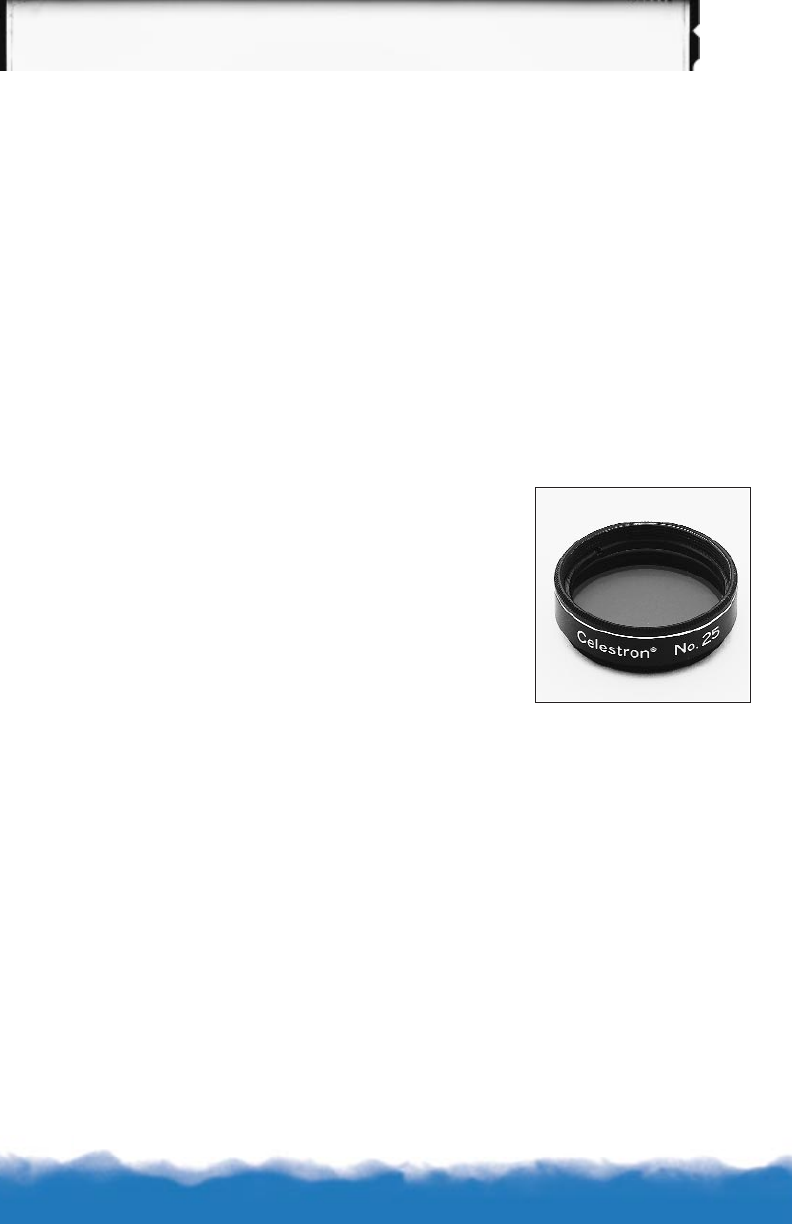
15
#8 Yellow 83% T [Series 4]
All observing information for this filter is the same as that given for the #12 and #15 Deep Yellow
filters, with the exception of the following:
Mars – Improves the Martian maria by reducing scattered light from blue areas, while allowing
passage of more green light for studying yellow dust clouds. Comets – Brings out highlights in
yellowish dust tails and enhances appearance of comet heads.
ORANGE
#21 Orange 46% T [#94118-05 & Series 1]
Moon – Greatly enhances lunar features. Jupiter – Improves appearance and detail revealed in
structure of Jovian belts. Enhances viewing of festoons and polar regions. Mars – Reduces light
from the blue and green areas which darken the maria, oases and canal markings, while lightening
the orange-hued desert regions. Also sharpens the boundaries of yellow dust clouds. Mercury –
Reduces the brightness of blue sky during daylight observing, to reveal surface features. Saturn –
Improves structure of the Saturnian bands and highlights blue polar regions. Venus – Use during
daylight observing to reduce brightness of blue sky. Comets – Enhances definition of comet dust
tails and heads in larger telescopes (11" and greater aperture). Solar – When using a Celestron Mylar
Solar Filter, adding this orange filter will give true color rendition.
RED
#25 Red 14% T [#94118-07 & Series 2]
Moon – Improves lunar features. Jupiter – Useful for studying bluer
clouds. Mars – Ideal for observation of the polar ice caps and features
on the Martian surface. Sharpens the boundaries of yellow dust
clouds. Mercury – Improves observation at twilight, when the planet
is near the horizon. During daylight, it reduces the brightness of the
blue sky to enhance surface features. Saturn – Useful for studying
bluer clouds. Venus – Use during daylight observing to reduce
brightness of blue sky. Occasionally deformations of the terminator are visible.
#23A Light Red 25% T [Series 3]
All observing information for this filter is the same as that given for the #25 filter, with the exception
of the following:
Mars – Reduces light from blue and green areas which darkens the maria, oases and canal markings,
while lightening the orange-hued desert regions. Sharpens the boundaries of yellow dust clouds.
Comets – Improves definition of comet dust tails.
BLUE
#80A Light Blue 30% T [#94118-12 & Series 1]
#82A Pale Blue 73% T [Series 4]
#38A Blue 17% T [Series 3]
Moon – Enhance lunar detail. Jupiter – Enhance the boundaries between the reddish belts and
adjacent bright zones. Useful for viewing the Great Red Spot. Mars – Very useful during the violet
clearing. Helpful in studying surface features and polar caps. Mercury – Improve observation of dusky
surface markings at twilight, when the planet is near the horizon. Saturn – Enhance low-contrast
features between the belts and zones. Venus – Useful for increased contrast of dark shadings in upper
Venusian clouds. Comets – Bring out the best definition in comet gas tails.


















